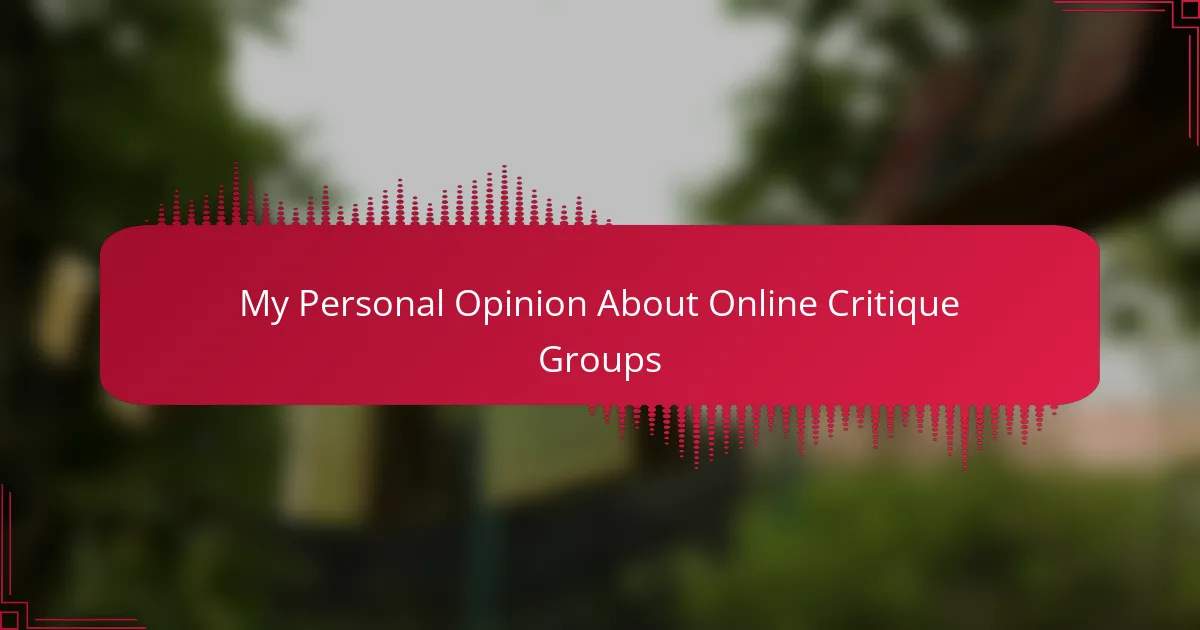Key takeaways
- Online critique groups provide valuable feedback and a supportive community for creators, enhancing their work through diverse perspectives.
- Key features of effective groups include clear guidelines, diverse membership, and a consistent meeting schedule to promote ongoing support and accountability.
- Maximizing feedback involves being specific in submissions, actively engaging with critiques, and reciprocating feedback to develop analytical skills.
- The future of online critique communities may include more interactive platforms and specialized groups that prioritize mental well-being and targeted advice for creators.
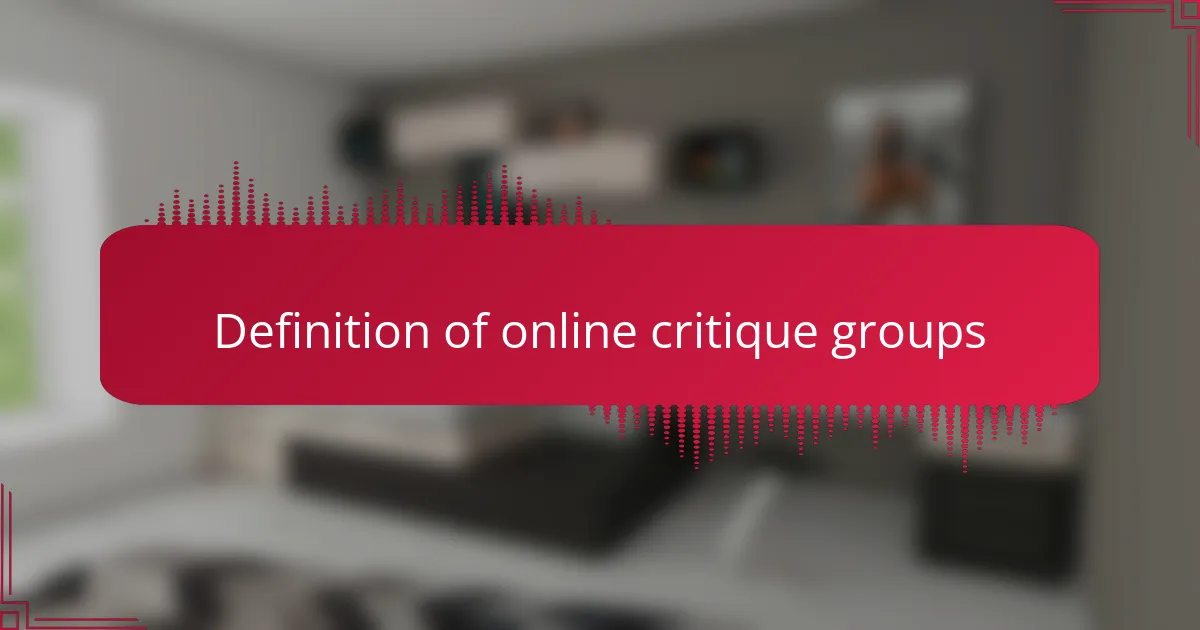
Definition of online critique groups
Online critique groups are virtual spaces where creators, particularly comic book authors, come together to share their work and provide feedback. I’ve found these groups to be a treasure trove of insight; they offer a platform for writers to gain diverse perspectives on their stories and artwork. It’s like having a supportive community right at your fingertips, allowing for growth and collaboration.
In my experience, the beauty of online critique groups lies in their accessibility. Whether you’re an emerging artist seeking constructive criticism or a seasoned author refining your craft, these platforms foster genuine connections that can enhance your work. The exchange of ideas and encouragement I’ve received has been invaluable, making me feel less isolated in my creative journey.
Here’s a simple comparison table that outlines some vital aspects of online critique groups:
| Feature | Benefit |
|---|---|
| Diverse Perspectives | Gain varied feedback from different creators |
| Accessibility | Participate from anywhere, anytime |
| Supportive Community | Reduce feelings of isolation and encourage growth |
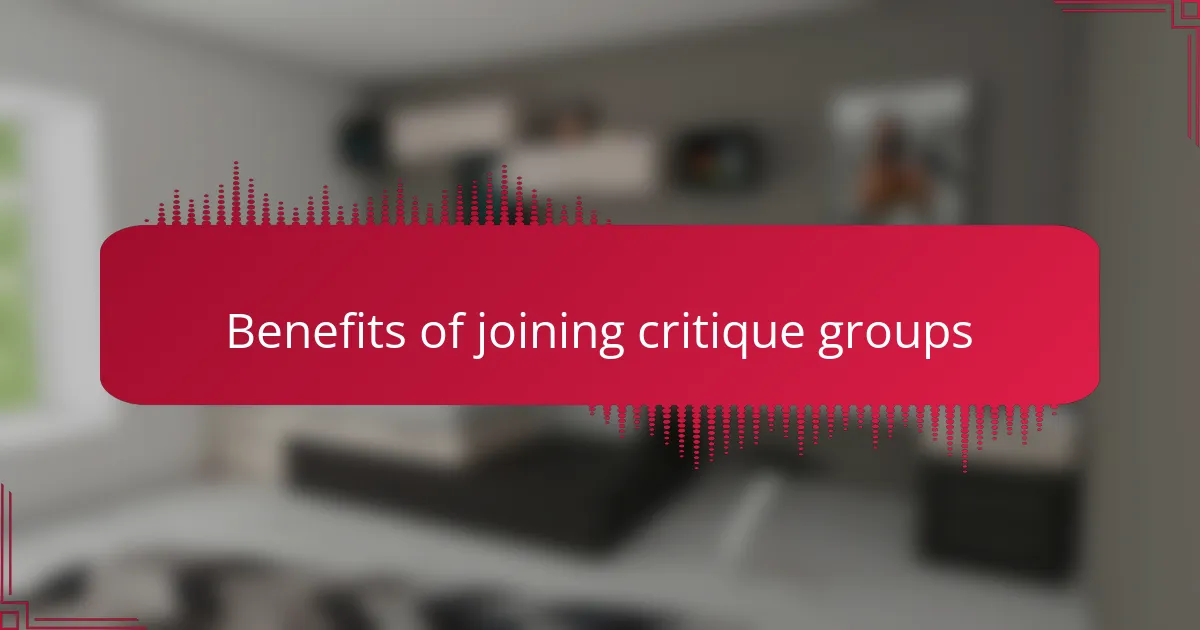
Benefits of joining critique groups
One of the biggest benefits I’ve experienced from joining online critique groups is the diverse perspectives they provide. It’s fascinating how one piece of art can be interpreted in so many different ways. This varied feedback has often opened my eyes to aspects of my work that I hadn’t considered, ultimately leading to richer, more nuanced storytelling.
Another significant advantage is the instant accessibility these groups offer. I fondly remember sharing a comic panel late at night and receiving thoughtful critiques almost immediately. This immediacy not only fuels my motivation but also helps me make timely adjustments before moving forward with my project.
Lastly, the supportive community made a huge difference in my creative process. When I share my struggles, it’s reassuring to know others have been there too. The encouragement I receive from fellow creators reminds me that I’m not alone on this journey, and that camaraderie can be a powerful catalyst for growth. How has support from others impacted your creative work? For me, it’s been a game-changer.
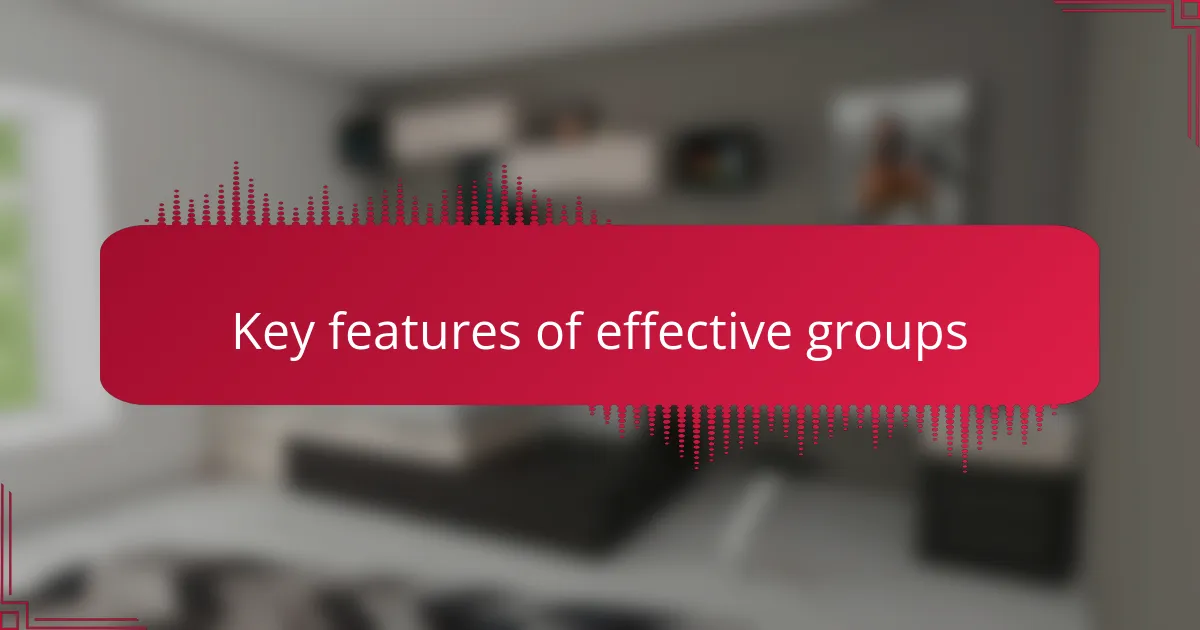
Key features of effective groups
When I look back at my own experiences in online critique groups, a few key features stand out that truly make a difference. One thing I’ve noticed is the importance of a structured format; without it, discussions can easily spiral out of control. I remember joining a group where we established specific guidelines for each session, and it really helped everyone stay focused and respectful of each other’s work.
Also, having a diverse group of voices can enrich the critique process immensely. It’s inspiring to see how different perspectives can highlight aspects of a comic book that might otherwise go unnoticed. I recall receiving feedback from a member who was an artist, and their insights opened my eyes to visual storytelling in ways I hadn’t considered before.
Key features of effective groups:
- Clear Guidelines: Establishing rules for critique sessions fosters respect and keeps discussions productive.
- Diverse Membership: A mix of backgrounds and expertise enriches the feedback, providing varied insights.
- Regular Schedule: Consistency in meeting ensures ongoing support and accountability for creators.
- Constructive Feedback: Emphasizing positive framing encourages a supportive environment, helping members grow.
- Open Communication: Encouraging honest but respectful dialogue allows for deeper exploration of ideas and concepts.
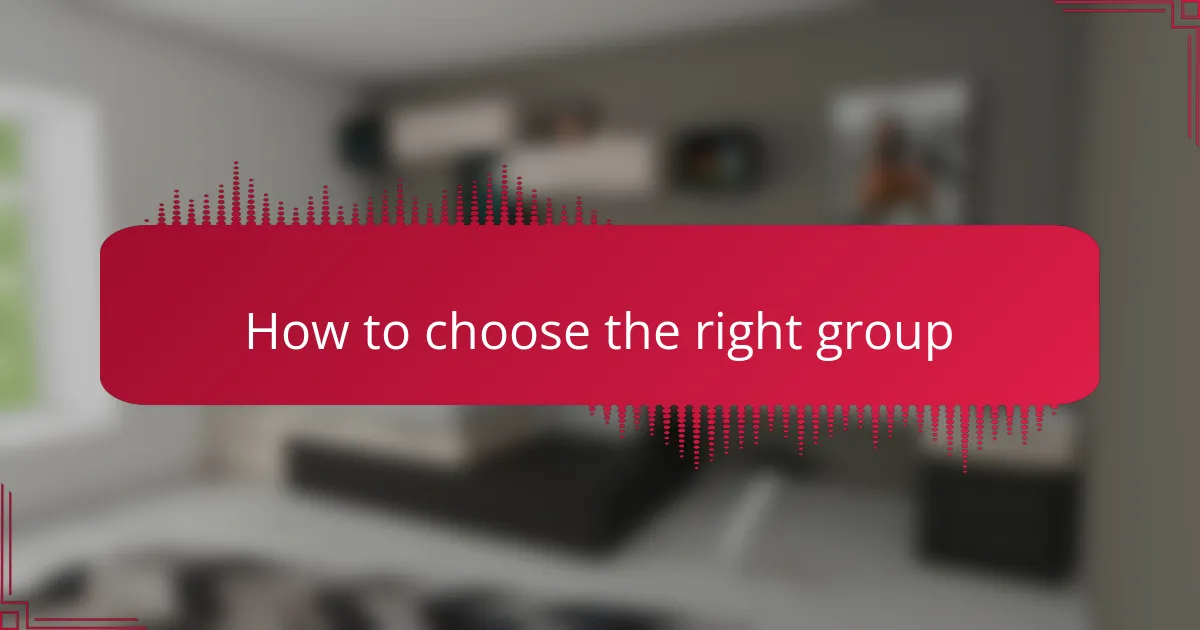
How to choose the right group
When it comes to choosing the right online critique group, my first piece of advice is to consider the focus of the group. Does it cater to comic book authors specifically, or is it a more general platform? I remember joining a group that primarily focused on prose, and while I learned a lot, the insights weren’t always relevant to my comic projects. Finding a group that understands the unique aspects of visual storytelling can greatly enhance the feedback you receive.
Next, I think it’s crucial to evaluate the group’s dynamics and communication style. Some groups are supportive, while others can be blunt or overly critical. I’ve had experiences with both, and those supportive environments really fostered my growth as a creator. Reflect on how you respond to critique—would you thrive in a more direct group, or do you prefer gentle nudges? Knowing your preferences will help you find a fit that motivates and inspires you.
Lastly, I suggest checking the regularity of meetings and the commitment of its members. Consistency can instill that sense of accountability we all need as creators. In one active group I participated in, the weekly feedback sessions kept me on my toes, pushing me to produce new content continually. Ask yourself—how much time are you willing to dedicate? Selecting a group that aligns with your creative pace can make all the difference.
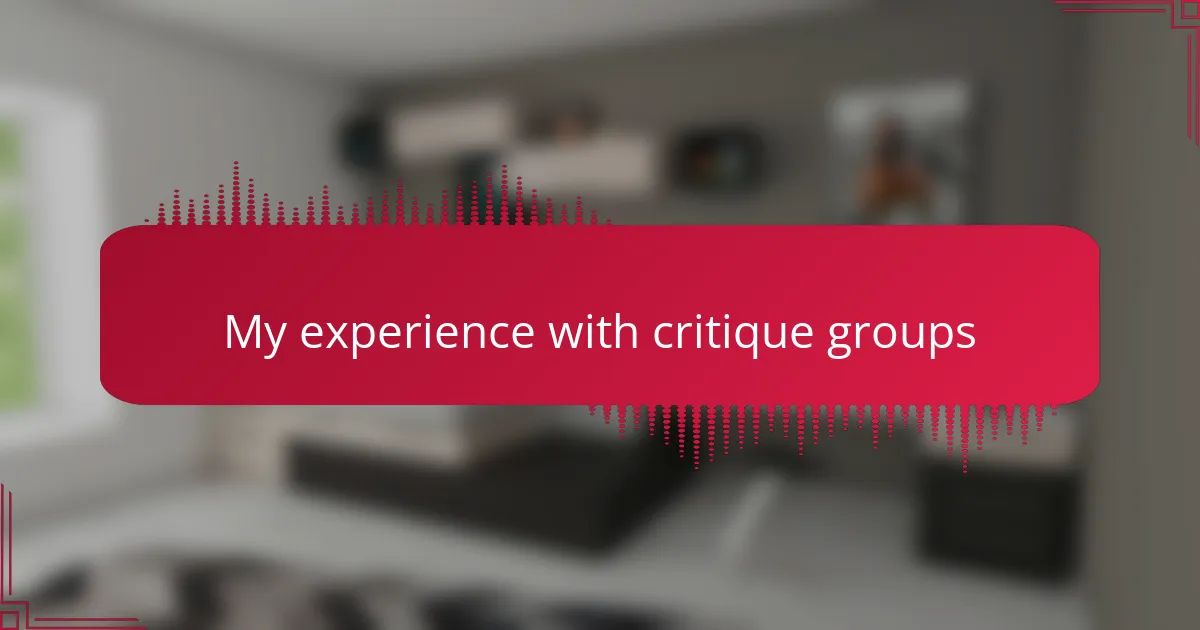
My experience with critique groups
Joining online critique groups has been a game-changer for me, particularly in how I approach feedback. I vividly recall a moment when I shared a draft of a comic page that I was genuinely excited about, but then I received a critique that focused on parts I didn’t expect. It was jarring at first, but I realized that those unexpected insights ultimately enriched my story. Reflecting back, I can see how those moments of discomfort led to significant improvements.
I also find that the relationships I’ve built in these groups often feel like a second family. During one particularly tough creative block, I turned to my group for support. Their encouragement and understanding helped me navigate that challenging period. This support reminds me that we’re all in this together—sharing in each other’s successes and struggles creates a bond that transcends geographic boundaries.
Sometimes, it’s easy to underestimate the power of a well-structured critique. I remember participating in a session where the facilitator had a clear agenda. This focus allowed everyone to contribute meaningfully without veering off-topic. Have you ever been in a chaotic group where things just seem to spiral? I know I have, and coming back to a well-organized setting felt like a breath of fresh air, allowing us to discover crucial insights about our work together.
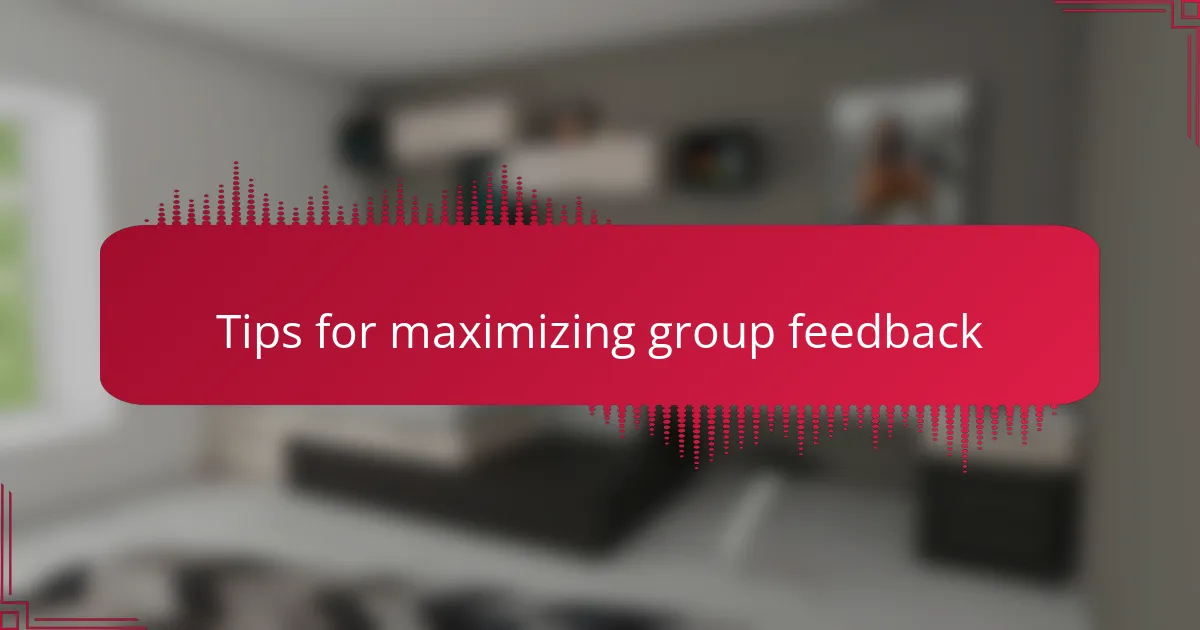
Tips for maximizing group feedback
When it comes to maximizing feedback from critique groups, I’ve found that being specific in your submissions really helps. Instead of presenting your entire work, try to share particular sections or elements you’re unsure about. This allows other members to focus their critiques and offer targeted advice. I once shared a scene that I thought flowed well, but their feedback revealed areas where my pacing was off, which I had completely overlooked.
Another tip is to actively engage with the feedback you receive. Don’t just take notes; ask questions and encourage discussions. When I first started, I was hesitant to dig deeper into their comments, but after trying it out, I realized it opened up new perspectives I never considered. The collaborative energy can be incredibly enriching, leading to improvements you might not have identified on your own.
Ultimately, remember to return the favor. Providing constructive feedback can strengthen your own analytical skills. As I’ve grown from giving critiques, I’ve also developed a better understanding of storytelling mechanics, which has significantly influenced my writing.
| Tip | Description |
|---|---|
| Be Specific | Share targeted sections for focused feedback. |
| Engage with Feedback | Ask questions to deepen understanding and discussion. |
| Reciprocate Feedback | Offer constructive critiques to enhance your analytical skills. |
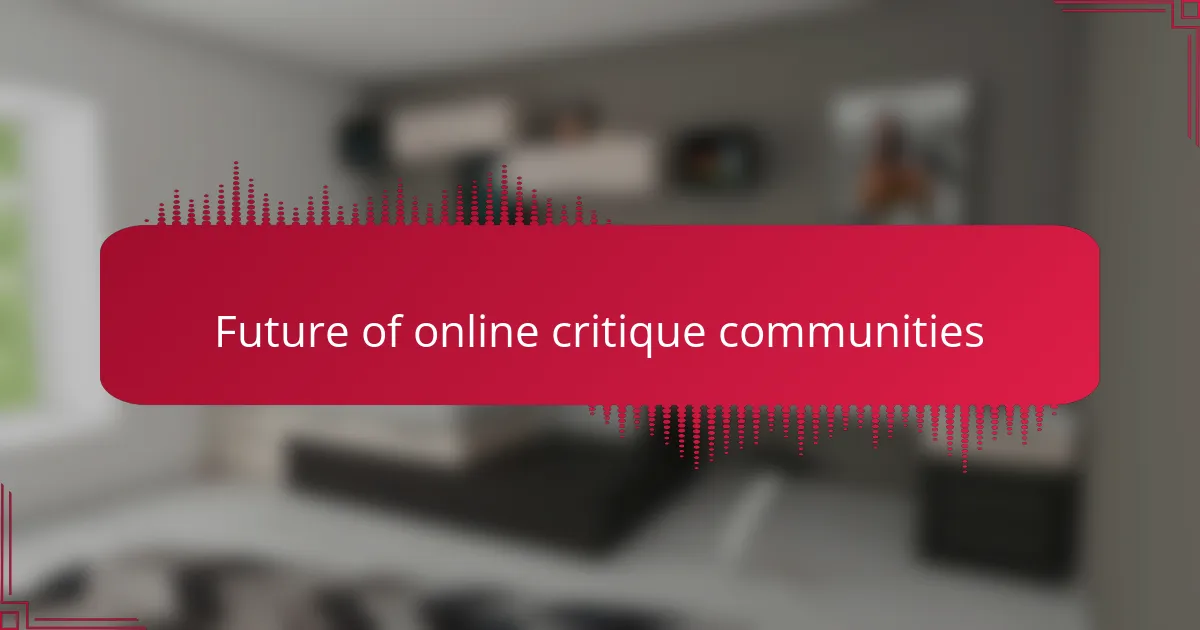
Future of online critique communities
As we look towards the future of online critique communities, I believe we’ll see an evolution in how these spaces function. With advancements in technology, I envision more interactive platforms emerging, allowing for real-time collaboration and feedback. For instance, imagine participating in live critique sessions where creators can discuss their work while sharing screens. It could make critiques more immediate and engaging, helping creators feel the excitement and energy of collaboration in a way that’s often missing from text-based comments.
I also think that the emphasis on mental well-being will reshape these online communities. There’s a growing awareness of how important it is to nurture a supportive atmosphere. I’ve yet to meet a creator who hasn’t felt vulnerable when sharing their work. I remember the anxiety of posting my first comic; the feedback could have either uplifted me or shattered my confidence. By prioritizing empathy and constructive critique, future groups may encourage creators to share more freely, creating a vibrant culture of mutual encouragement.
Another trend I foresee is the rise of specialized critique groups tailored to specific genres or styles within comics. This could make a huge difference for creators looking for targeted advice. While I’ve benefited from general groups, I often wonder how much richer my feedback could be if it were honed to the unique challenges of my particular genre or artistic approach. Specialized groups could connect creators with similar passions, leading to deeper insights and more meaningful exchanges. Don’t you think that would be a game-changer for many artists on their creative journeys?
